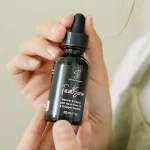Coming into the holiday season you’ll be tempted by sugar, alcohol, and other indulgences that may come at a high price. This may be a good time to address the issue head on, and start your New Year’s resolution in advance!
Do you crave something sweet after dinner or between meals? Do you have to have your morning coffee, at all costs, or keep craving and drinking it throughout the day? Do you find that you can’t wait to get home for that end-of-the-day drink, and can’t relax without it?
You are not alone and you are not simply weak-willed or dependent. Rather, whether from genetics, stress, or diet (or all three), you are dealing with a brain chemistry imbalance, and looking for the most convenient solution you can grab. This chemical imbalance can be depleting your energy and peace of mind, and you don’t even know it!
You may protest, “I just like my morning coffee” … (or “my after-work beer with friends” or “my glass of wine with dinner” or “my bag of chips in the evening”)… I could give it up any time.” Often these habits appear to be just tension relievers, pick-me-ups, or one of the normal pleasures of life. But are they? Generally, the answer is no.
Research shows that we can successfully treat addiction with the use of specific nutrients, especially amino acids. These include precursors to the neurotransmitters: serotonin, dopamine, and glutamine as well as GABA (a neurotransmitter and amino acid). When neurotransmitter precursors were given to alcoholic subjects the individuals experienced:
- Fewer cravings for alcohol
- Reduced incidence of stress
- Increased likelihood of recovery
- Reduction in relapse rates
To prove the point, research has been done with rats, where they were made “alcoholic,” then treated with amino acids. When tested further, they had lost their cravings and addiction!
Similar findings have been seen when researching addiction to carbs. In addition to eliminating refined carbohydrates (such as sugar and white flour), cutting out coffee and alcohol, and eating small, frequent meals containing protein and complex carbohydrates, a daily nutritional supplement regimen can help greatly. Additionally, serotonin, pantothenic acid and vitamin C are helpful to boost serotonin levels. Finally, 500–1000 mg of glutamine is generally a good rule-of-thumb to curb the cravings. Implementing these changes, as well as a good exercise program, can help a carb addict to stabilize blood sugar levels, increase energy and the ability to handle stress without turning to the preferred substance.
To quote Jonathan, a 32-year-old sales agent with a history of cocaine and alcohol addiction (as well as several other compulsive and destructive behaviors) who has been sober for three years, “I’ve been helped enormously by vitamins, the 12-step programs, eating right, and exercising regularly. I don’t even drink coffee or use sugar. I found that they were as addictive as drugs, and would give me the same pattern of highs and lows. My ADD (Attention Deficit Disorder) is under control, too. I can concentrate, remember things, and keep my desk and my life organized for the first time. It’s been a hard road, but I can honestly say that I have never felt better!”
Jonathan had a biological tendency toward low levels of certain key neurotransmitters and once he started using drugs he couldn’t stop. With adequate neurotransmitter precursors, such as L-glutamine, and tyrosine, 500 mg of each three times daily, his mood became normal, without the depression and anxiety that had always plagued him. In closing, I feel it is important to say that we are not simply victims of our genetic makeup. Genetics give only the predisposition to a condition. Its actual manifestation, or expression, can be influenced and changed. That being said, even in “normal” people, repeated use of certain substances can lead to addiction, as can stress itself. By understanding our propensities, we can take the appropriate precautionary steps or do good remedial work, if we have already been affected. This applies to the use of caffeine, sugar, chocolate, and tobacco as well. Each has its own way of stimulating the reward cascade, but the end result is the same. They all raise blood sugar and dopamine, stimulating the brain’s pleasure center—leading to the brain’s becoming addicted to them.
TIPS FOR HANDLING CRAVINGS
A quick and effective fix for cravings: Open and empty a 500 mg capsule of L-glutamine powder under your tongue. It is absorbed quickly and should give you a pick-me-up similar to that of the longed-for stimulant (including alcohol). To prevent cravings a 500–mg capsule of L-glutamine several times a day is invaluable. Adding 500 mg of DL-phenylalanine, two to three times daily, will also give a necessary energy boost.
Chocolate Cravings
Among other ingredients, chocolate contains phenethylamine, magnesium, fat and sugar. One of these ingredients is probably causing the craving. To cover all four, take the following supplements: 500–1,000 mg of DL-phenylalanine two to three times daily, 400–600 mg of magnesium daily; 1 tablespoon of flaxseed oil twice daily.
Coffee and Caffeine Cravings
It takes an average of four days to break the coffee habit. During the time, you may experience headaches and drowsiness, a natural part of the withdrawal process. These are strong reminders of how bad coffee really is for you. Concentrate on this reality and it will become a real incentive to stop “using” caffeine. Green tea is a reasonable caffeine-containing substitute and has many health benefits, besides.
Alcohol Cravings
It is all easy to overindulge in alcohol because of its role in social interaction. Start by limiting the times you have alcohol. Ideally, cut it out completely for at least two weeks. If you find this hard to do, take a close look at your drinking habits and, if necessary, seek professional help, or join AA. I have found it a great support network for many of my patients and readers. There is a great deal of self-deception that goes on in the name of “just social drinking.” Above all, remember this is a brain imbalance, not a crime, but it can turn into one if you don’t do something about quitting.
Smoking
Nicotine is more addictive than heroin, which makes quitting smoking difficult. This effect is due to nicotine’s action on adrenal hormones, blood sugar, and brain chemicals. To start with, reduce your nicotine load gradually by switching to a lower nicotine brand. About a month or so before starting to quit, stop consuming stimulants such as tea, coffee, chocolate, and sugar. Also recommended is to follow a blood sugar stabilizing diet-eating small, frequent meals, with an emphasis on foods containing slow-releasing carbohydrates combined with foods rich in protein. In addition to a high quality antioxidant supplement combination, the following can be very helpful; 1,000 mg of vitamin C; 100 mg of chromium; 50 mg of niacin; 600 mg of calcium and 400 mg of magnesium (both are alkaline minerals that help to neutralize the excess acidity that adds to the craving); 200 mg of 5-hydroxytryptophan (5-HTP), either 100 mg twice daily or 200 mg one hour before bed.
An overall brain nutrient and stabilizer for all addictions and imbalances is fish oil, an omega-3 oil containing EPA and DHA. Fish oil helps to build the brain cell wall, to enhance brain cell communication, and acts as an excellent anti-inflammatory, noted for its role in preventing Alzheimer’s disease. The individual nutrients can be obtained from your health food store.











